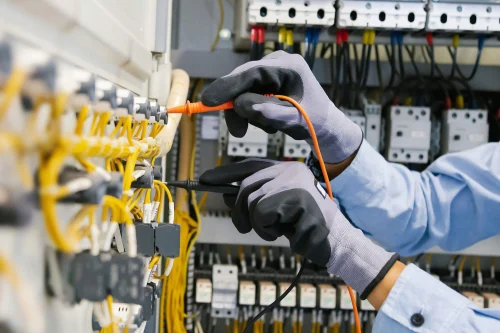Industrial and commercial Electrification work

Industrial and Commercial Electrification Work Across Maharashtra, Mumbai, Navi Mumbai, Nagpur, Nashik, Thane, Pune and Aurangabad
Electrification is the backbone of modern industries and commercial spaces. In a fast-growing state like Maharashtra, with cities such as Mumbai, Navi Mumbai, Nashik, Nagpur, and Thane emerging as industrial and commercial hubs, efficient and reliable electrification is crucial. Here’s a closer look at how industrial and commercial electrification projects are shaping the infrastructure and economy in these key regions.
Industrial and Commercial Electrification in Mumbai
Industrial and Commercial Electrification in Mumbai, India’s financial capital, is a city that never sleeps. The electrification needs here are immense, given the scale of industries, skyscrapers, malls, and commercial complexes. From high-voltage power distribution to advanced automation systems, electrification projects in Mumbai demand expertise, precision, and cutting-edge technology.
Key Services Offered:
- Installation of industrial-grade transformers and switchgear.
- Designing and setting up energy-efficient lighting systems.
- Integration of renewable energy solutions such as solar power.
- Maintenance and troubleshooting of complex electrical systems.
With Mumbai’s push towards sustainable energy solutions, many industrial and commercial spaces are adopting green energy practices, further driving the demand for advanced electrification solutions.
Industrial and Commercial Electrification in Navi Mumbai
As Industrial and Commercial Industrial and Commercial Electrification in Navi Mumbai planned twin city, Navi Mumbai is rapidly becoming an industrial and IT hub. With its well-planned infrastructure and numerous Special Economic Zones (SEZs), the demand for reliable electrification services is at an all-time high.
Unique Challenges in Navi Mumbai:
- Ensuring power distribution across vast industrial parks.
- Setting up robust systems for data centers and IT parks.
- Developing scalable electrical grids to meet future expansion needs.
Companies in Navi Mumbai rely on experienced service providers for efficient electrical installations, ensuring minimal downtime and maximum operational efficiency.
Industrial and Commercial Electrification in Nashik
Industrial and Commercial Electrification in Nashik is known for its wine industry, manufacturing units, and growing IT sector. The city’s industrial electrification needs focus on ensuring reliable power for diverse sectors ranging from agro-based industries to automotive plants.
Core Solutions in Nashik:
- Industrial automation and control systems.
- Power backup systems for uninterrupted operations.
- Comprehensive wiring and cabling for large-scale industrial setups.
The government’s push for industrial growth in Nashik has led to a surge in demand for top-notch electrical contractors and solutions.
Industrial and Commercial Electrification in Nagpur
Industrial and Commercial Electrification in Nagpur, positioned as the logistics hub of India, is witnessing a boom in warehousing, manufacturing, and IT services. Reliable and efficient electrification solutions play a critical role in the city’s industrial and commercial growth.
Services Tailored for Nagpur’s Needs:
- High-voltage electrical installations for factories and warehouses.
- Energy management systems for optimized consumption.
- Integration of IoT-based solutions for smarter energy usage.
Nagpur’s electrification projects often focus on creating sustainable and scalable systems to support the city’s strategic growth plans.
Industrial and Commercial Electrification in Thane
Industrial and Commercial Electrification in Thane, often considered an extension of Mumbai, has a thriving industrial and commercial landscape. Its proximity to Mumbai makes it a preferred destination for businesses looking for cost-effective yet high-quality electrical infrastructure.
Services in Demand:
- Comprehensive electrical audits to ensure safety and compliance.
- Installation of energy-efficient HVAC and lighting systems.
- Maintenance services for uninterrupted operations in factories and offices.
Thane’s industrial and commercial spaces benefit from customized electrification solutions that cater to their specific needs.
Industrial and Commercial Electrification in Pune
Industrial and Commercial Electrification in Pune, Often referred to as the “Oxford of the East” and a major IT and manufacturing hub, has a thriving industrial and commercial sector. The city’s electrification needs are diverse, ranging from high-tech IT parks to large-scale manufacturing units. Pune’s focus on innovation and sustainability makes it a hotspot for advanced electrification solutions.
Services in Demand:
– Installation of high-capacity transformers and switchgear for industrial complexes.
– Designing energy-efficient electrical systems for IT parks and commercial buildings.
– Integration of renewable energy solutions such as solar and wind power.
– Industrial automation and control systems for seamless operations.
Pune’s industrial and commercial spaces benefit from customized electrification solutions that cater to their specific needs, ensuring safety, efficiency, and sustainability.
Industrial and Commercial Electrification in Aurangabad
Industrial and Commercial Electrification in Aurangabad, known for its historical significance and growing industrial base, is emerging as a key player in Maharashtra’s industrial landscape. The city’s electrification needs are driven by its manufacturing units, particularly in the automotive and pharmaceutical sectors.
Services in Demand:
– Installation of industrial-grade transformers and switchgear.
– Designing and setting up energy-efficient lighting systems.
– Integration of renewable energy solutions such as solar power.
– Maintenance and troubleshooting of complex electrical systems.
Aurangabad’s industrial and commercial spaces rely on experienced service providers for efficient electrical installations, ensuring minimal downtime and maximum operational efficiency.
Industrial and Commercial Electrification in Maharashtra
Industrial and Commercial Electrification in Maharashtra, being one of the most industrialized states in India, has a diverse range of electrification needs across its cities. From Mumbai to Pune, Nagpur to Aurangabad, each city presents unique challenges and opportunities for industrial and commercial electrification.
Services in Demand:
– Installation of high-capacity transformers and switchgear.
– Designing energy-efficient electrical systems for various sectors.
– Integration of renewable energy solutions such as solar and wind power.
– Industrial automation and control systems for seamless operations.
Why Choose Professional Industrial and Commercial Electrification in Maharashtra?
Across Industrial and Commercial Electrification in Maharashtra, electrification services are more than just about wiring and power distribution. They encompass:
- Safety and Compliance: Ensuring adherence to industry standards and regulations.
- Energy Efficiency: Reducing energy consumption through innovative technologies.
- Sustainability: Incorporating renewable energy and smart solutions.
- Reliability: Providing round-the-clock support for uninterrupted operations.
From Mumbai to Nagpur, each city’s electrification needs are unique, demanding tailored solutions that address local challenges while aligning with global standards.
Industrial Electrification
Overview
Industrial electrification refers to the electrical work conducted within industrial facilities such as factories, manufacturing plants, and other production sites. This type of electrification is critical for powering heavy machinery, ensuring safety, and maintaining operational efficiency.
Key Components
- Power Distribution Systems:
- High Voltage Systems: Installation of transformers and substations to step down high voltage electricity from the grid to usable levels within the facility.
- Low Voltage Systems: Distribution of electricity throughout the plant using switchgear, bus bars, and distribution panels.
- Machinery and Equipment Wiring:
- Wiring and connection of large industrial machines, conveyor systems, and robotic equipment.
- Ensuring proper grounding and bonding to prevent electrical hazards.
- Control Systems:
- Installation of programmable logic controllers (PLCs), motor control centers (MCCs), and automation systems for process control and monitoring.
- Integration of sensors, relays, and communication networks for seamless operation.
- Lighting and Emergency Systems:
- Designing and installing efficient lighting systems for large industrial spaces.
- Implementing emergency lighting and power systems to ensure safety during power outages.
- Safety and Compliance:
- Ensuring all electrical installations meet local and national electrical codes and standards (e.g., NEC, IEC).
- Regular inspections and maintenance to prevent electrical failures and hazards.
Commercial Electrification
Overview
Commercial electrification involves electrical work in commercial buildings such as offices, retail stores, hotels, and other public or private business spaces. The focus is on ensuring reliable power supply, safety, and energy efficiency.
Key Components
- Power Distribution:
- Designing and installing electrical panels, circuit breakers, and distribution boards.
- Ensuring balanced load distribution to prevent overloads and ensure efficient energy use.
- Lighting Systems:
- Installation of energy-efficient lighting solutions, including LED lighting.
- Implementing automated lighting controls (e.g., motion sensors, dimmers) for energy savings.
- HVAC and Building Automation:
- Wiring and integrating heating, ventilation, and air conditioning (HVAC) systems.
- Installing building automation systems (BAS) for centralized control of electrical, lighting, and HVAC systems.
- Data and Communication Systems:
- Setting up structured cabling for data networks, telecommunication, and security systems.
- Ensuring robust and scalable infrastructure for IT and communication needs.
- Safety Systems:
- Installing fire alarm systems, smoke detectors, and emergency exit lighting.
- Ensuring compliance with safety regulations and standards (e.g., NFPA, OSHA).
- Energy Management:
- Implementing energy management systems (EMS) to monitor and optimize energy usage.
- Utilizing renewable energy sources such as solar panels and integrating them into the building’s power system.
Common Tasks in Industrial and Commercial Electrification
- Planning and Design: Collaborating with architects and engineers to design electrical systems that meet the specific needs of the facility.
- Installation: Running conduit, pulling wire, and connecting electrical components according to design specifications.
- Testing and Commissioning: Verifying that electrical systems are installed correctly and function as intended.
- Maintenance and Repair: Conducting routine inspections and performing repairs to ensure ongoing reliability and safety.
Skills and Qualifications
- Knowledge of Electrical Codes and Standards: Understanding of local, national, and international electrical codes.
- Technical Expertise: Proficiency in using electrical tools and equipment.
- Problem-Solving Skills: Ability to troubleshoot and resolve electrical issues.
- Safety Awareness: Adherence to safety protocols to prevent accidents and injuries.
Conclusion
Industrial and commercial electrification work is essential for the functioning and safety of various facilities. It requires a combination of technical knowledge, practical skills, and a commitment to safety and efficiency.
